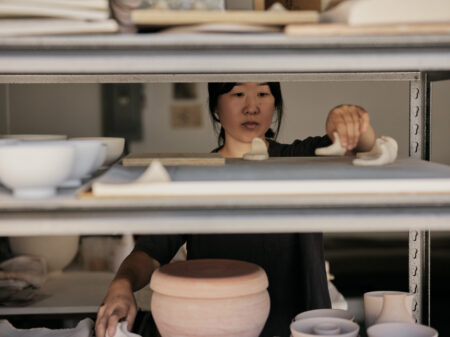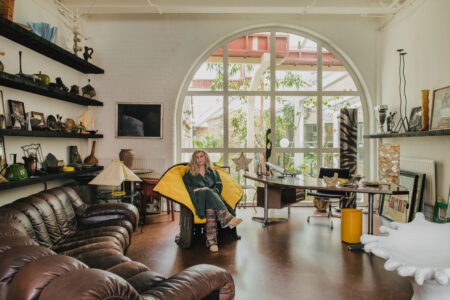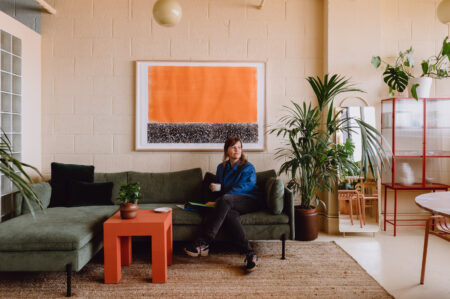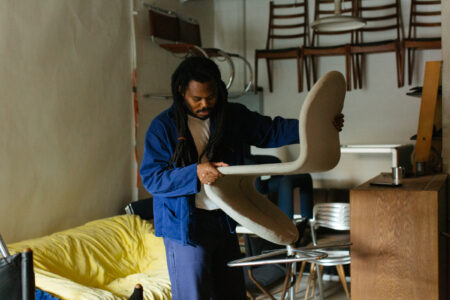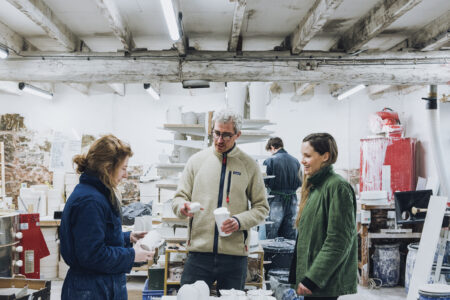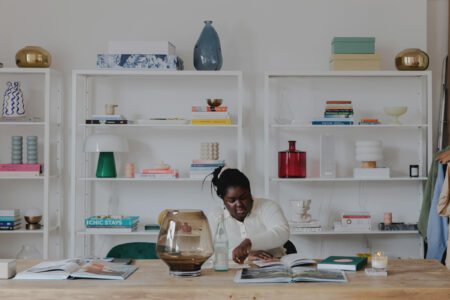Gynelle Leon, founder of cactus and succulent store Prick, on the restorative impact of nature and opening her new creative space, Shallow Roots

It seems bizarre now, but back in 2015, when Gynelle Leon was planning to open her shop dedicated to cacti and succulents, there wasn’t a lot of competition. Prick in Dalston was one of the first spaces to offer what has since become an interiors staple – cacti and succulents of all sizes. Gynelle is probably the reason you have anything from a small potted Globular cactus to sprawling Saguaros in your home or garden.
But it isn’t just sharp business acumen that has set Gynelle apart from her commercial competitors; she is also passionate about helping people reconnect with the natural world. This care and tenderness is evident in everything she does, including at the new space she is set to open in June; Shallow Roots will be a place for bringing people together, for creative workshops and sharing knowledge around plant culture. We meet Gynelle as the paint is drying on the walls to find out more.



Gynelle: “My life and career started on a very different path. To begin with, I was working in private banking and went onto get a masters in forensic science. I felt like I was following this prescribed route that society expected: you go to university, you get a good job, you get a house, you get married, you have children, and that’s the rigid idea of success. I was on that journey, but I wasn’t happy.
“While working, I went on a part-time floristry course and did an internship at Flower Essence, an amazing florist in Bethnal Green. It was a really lovely company owned by a woman called Sandy and her uncle, who specialised in Indian weddings. They knew I wanted to open my own store, so they showed me everything about pricing, wholesale, caring for the stock. It was a great learning experience.
“I’ve got an academic background; I like to get as much knowledge as possible on any topic, so I read as much as I could about cacti and plants. Anything I couldn’t get from books I found by visiting cactus collectors all over the country. Twelve months after leaving my job I opened Prick on Kingsland Road, Dalston, in 2016.
“With a lot of people spending more time at home over the last year, there has been this palpable need to bring the outside in, to surround ourselves with nature and plants. There’s something really special about caring for a plant, watering it, making sure it’s in the right environment. That helped a lot of people over lockdown. The physical store was only open for four months over the last year, but online orders sustained us, and I still get a lot of updates and emails from customers whose plants and cacti are thriving.


“The Dalston store has been perfect, and it’s so good to have it open again after lockdown, but I’ve always wanted to open a bigger space, to be able to store the plants on-site and host events or workshops to bring people together. A while ago, I had the idea of creating a zine and an online platform called Shallow Roots that looked at plant culture as a whole – often articles or magazines are only focused on one specific area or topic. I wanted to look at the whole eco-system, and I guess this space is a physical manifestation of that idea, including the name.
“It’s going to be a lot more of a creative space, somewhere for sharing ideas and bringing people together. It’s somewhere you can come and immerse yourself in plant culture, learn, get your hands dirty, meet other people, buy new plants, get tips on taking care of your existing plants and get a coffee.
“We’re going to be doing things like cacti grafting workshops, repotting workshops and botanical still-life classes. The cacti grafting workshops is a personal favourite. You perform surgery on cacti, and create this new, unique plant. Working with plants in this way makes you feel connected and calm.
“I think this idea and practice of getting back to nature is so important because, for millennia, all of our ancestors had a deep connection with the earth; they were hunter-gatherers. They had to be in tune with nature to survive; they would hunt, forage or grow their own food. Now a vast majority of us live an urban existence. If you’re going to and from work by car or train or even if you’re working from home, you can go weeks without having any real contact with nature.




“It’s so important for us to reconnect with nature as it’s really grounding, and I think that’s why house plants have become so much more popular recently, especially over lockdown. It feels nourishing and positive to take time to stop and touch the leaves, check the soil, give it some water; any moments that we’re not on our phones or we stop to take time outside of ourselves are vital to protect.
“I wanted the space to have a modern, minimalist feel where the plants are the main focus. There are many types of wood and different stains, from the large central table to the bar, and the wooden sculptures by Grain and Knot; it comes back to wanting to inspire a feeling of being grounded.
“My first book came out in 2017, and that was focused on caring for cacti and succulents. My most recent book, which came out in April 2021, looks more at houseplants – caring, choosing and styling them in your own home. We’d planned to shoot in a lot of different people’s homes, but because of the pandemic, either I couldn’t travel, or we weren’t allowed in each other’s homes, so I had to ask some of the people I featured to shoot their own images. But those personal shots have made it really special.
“The pandemic has also forced me to deal with my perfectionism. Now I’m a lot more relaxed about creating something, whether that’s designing a new product or opening this new space. I’m not interested in making them perfect because things are never perfect – things can always be improved, and that’s ok.



“Success means different things to different people, but to me, I feel successful because I get to work on lots of different things. No day is the same, and I love it all, whether it’s photography, writing, working on the business, working with the plants, running workshops – it’s what I love. I also think it’s about knowing yourself really well and not being swayed by what you think you should be saying yes to; about having the confidence to turn things down when they don’t align, even if they seem like a good thing on the surface.
“I believe that plant care begins before you even make a purchase. Start by choosing the position in your home that you’d like to place a new plant. Check the environment of this position; how much light does this position get? Which direction is the light coming from? What’s the humidity and temperature like? These are all important questions that can help you choose the best plant for that area.
“Now you are equipped to research what plants are suited for this environment, or, when you are out shopping, you can check that the care requirements of the plants you’re interested in match those of your home. Once home, pop your new plants in quarantine for up to three weeks, checking their soil, roots and leaves for any disease or pests to ensure it doesn’t spread any problems to the rest of the plant family. Once you’re happy the new plants are healthy, you can welcome them into your home to enjoy their therapeutic properties.”
Read more in, Plant: House plants: choosing, styling, caring, by Gynelle Leon






